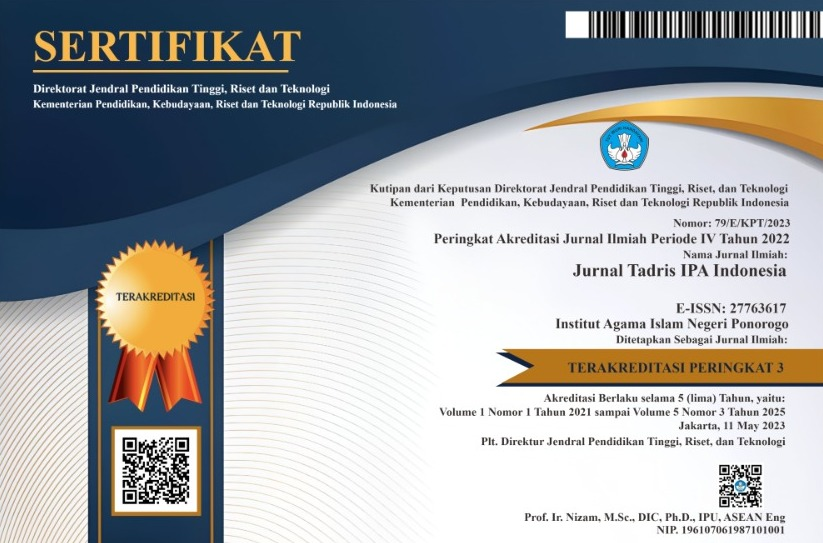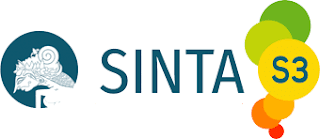Efektivitas Model Pembelajaran Scramble dengan Pendekatan Socio-Scientific terhadap Rasa Ingin Tahu Peserta Didik
Abstract
Penelitian ini bertujuan untuk mengetahui efektivitas pembelajaran menggunakan model scramble dengan pendekatan socio-scientific di MTs Al-Ishlah. Penelitian ini menggunakan metode kuantitatif Eksperimen. Sampel pada penelitian ini adalah kelas VIII A sebanyak 16 peserta sebagai kelas eksperimen dan kelas VIII B sebanyak 16 peserta sebagai kelas kontrol. Pengambilan data dengan cara membagikan angket kepada peserta didik sesudah menerapkan model pembelajaran scramble dengan pendekatan socio-scientific. Data dianalisis dengan uji-t menggunakan software SPSS. Berdasarkan hasil penelitian diketahui bahwa nilai P-value sebesar 0,000. Karena P-Value kurang dari 0,05 maka H0 ditolak. Hal ini menunjukkan bahwa terdapat perbedaan yang signifikan antara rasa ingin tahu peserta didik yang menggunakan model pembelajaran scramble dengan pendekatan socio-scientific dengan rasa ingin tahu peserta didik yang menggunakan model pembelajaran konvensional.
References
Ariyanto, M. (2018). Peningkatan Hasil Belajar Ipa Materi Kenampakan Rupa Bumi Menggunakan Model Scramble. Profesi Pendidikan Dasar, 3(2), 133. https://doi.org/10.23917/ppd.v3i2.3844
Ganesha, U. P. (2016). Penerapan_Model_Pembelajaran_Scramble_Un. 1–10.
Gottfried, A. E., Preston, K. S. J., Gottfried, A. W., Oliver, P. H., Delany, D. E., & Ibrahim, S. M. (2016). Pathways from parental stimulation of children’s curiosity to high school science course accomplishments and science career interest and skill. International Journal of Science Education, 38(12), 1972–1995. https://doi.org/10.1080/09500693.2016.1220690
Higgins, J., & Moeed, A. (2017). Fostering Curiosity in Science Classrooms: Inquiring into Practice Using Cogenerative Dialoguing. Science Education International, 28(3), 190–198.
Kolstø, S. D., Bungum, B., Arnesen, E., Isnes, A., Kristensen, T., Mathiassen, K., Mestad, I., Quale, A., Tonning, A. S. V., & Ulvik, M. (2006). Science students’ critical examination of scientific information related to socioscientific issues. Science Education, 90(4), 632–655. https://doi.org/10.1002/sce.20133
Kusumawati, N. (2019). Pengaruh Model Pembelajaran Scramble Dengan Media Question Card Terhadap Hasil Belajar IPA Siswa Kelas IV SDN Kertosari II Kabupaten Madiun. Ibriez : Jurnal Kependidikan Dasar Islam Berbasis Sains, 4(1), 87–100. https://doi.org/10.21154/ibriez.v4i1.66
Muhammad, S. N., Adhani, A., & Listiani. (2018). Hubungan Antara Literasi Sains Dan Rasa Ingin Tahu Siswa Pada Materi Ekosistem Di Sma Negeri 3 Tarakan ( Correlation Between Science Literacy and Student Curiosity on Ecosistem Topic At Sma Negeri 3 Tarakan ). Natural: Jurnal Ilmiah Pendidikan Ipa, 5(2), 112–116.
Nihayah, D., Rahayu, E. S., & Nugrahaningsih. (2018). Development of Alternative Plant Tissue Culture Module to Optimize Science Process Skills and Curiosity in Modern Biotechnology Learning in High School. Jounal of Innovative Science Education, 7(2), 336–342.
Özden, M. (2015a). Pandangan Calon Guru Sekolah Dasar tentang Masalah Ilmu Sosial : Studi Desain Paralel Bersamaan. 7(3), 333–354.
Özden, M. (2015b). Prospective elementary school teachers’ views about socioscientific issues: A concurrent parallel design study. International Electronic Journal of Elementary Education, 7(3), 333–354.
Raharja, S., Wibhawa, M. R., & Lukas, S. (2018). Mengukur rasa ingin tahu siswa. POLYGLOT, Jurnal Ilmiah, 14(2), 151. https://doi.org/10.19166/pji.v14i2.832
Riani, W. S., & Rozali, Y. A. (2014). Hubungan antara self efficacy dan kecemasan saat presentasi pada mahasiswa univeristas esa unggul. Jurnal Psikologi, 12(1), 1–9. https://ejurnal.esaunggul.ac.id/index.php/psiko/article/view/1457
Rohmah, S., Hana, S., & Nafiqoh, H. (2019). Efektivitas Rasa Ingin Tahu (Kuriositas) Anak Usia Dini Melalui Edutainment Dengan Metode Sains Sederhana. CERIA (Cerdas Energik Responsif Inovatif Adaptif), 2(5), 237. https://doi.org/10.22460/ceria.v2i5.p237-242
Topcu, M. S., Sadler, T. D., & Yilmaz-Tuzun, O. (2010). Preservice science teachers’ informal reasoning about socioscientific issues: The influence of issue context. International Journal of Science Education, 32(18), 2475–2495. https://doi.org/10.1080/09500690903524779
Weible, J. L., & Zimmerman, H. T. (2016). Science curiosity in learning environments: developing an attitudinal scale for research in schools, homes, museums, and the community. International Journal of Science Education, 38(8), 1235–1255. https://doi.org/10.1080/09500693.2016.1186853
Wiyarsi, A., & Çalik, M. (2019). Revisiting the scientific habits of mind scale for socio-scientific issues in the Indonesian context. International Journal of Science Education, 41(17), 2430–2447. https://doi.org/10.1080/09500693.2019.1683912
Jurnal Tadris IPA Indonesia allow the author(s) to hold the copyright without restrictions and allow the author(s) to retain publishing rights without restrictions, also the owner of the commercial rights to the article is the author.









